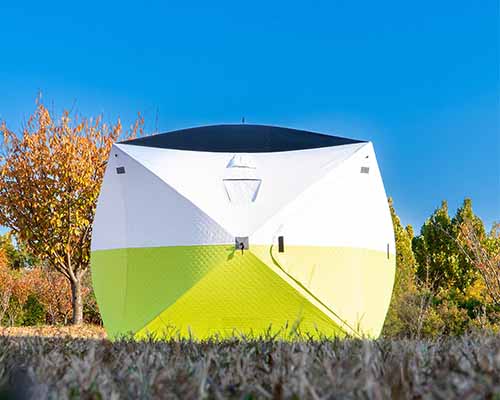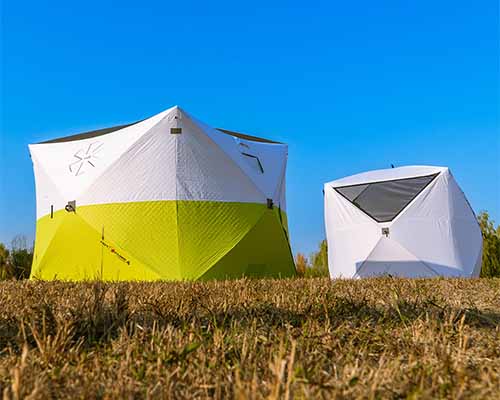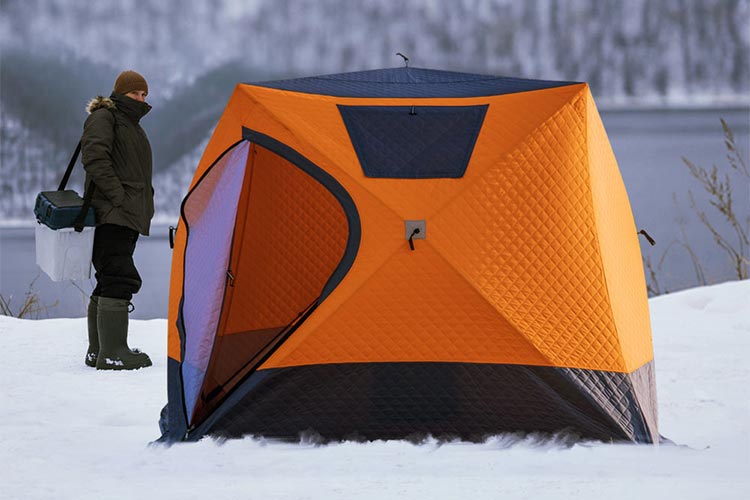Table of Contents
Ice fishing isn’t simply a winter sport — in regions like Minnesota, Wisconsin, Michigan, Alaska, and Canada, it’s a seasonal lifestyle. Early mornings, bitter-cold winds sweeping across frozen lakes, the sound of an auger ripping through ice, and the anticipation of crappie, walleye, pike, or perch beneath your feet.
In the middle of all this, one piece of equipment defines comfort, success, and safety: your ice fishing tent.
Whether you’re a dedicated angler planning multi-day ice trips or a business sourcing customized winter shelters, the right tent can make all the difference. This guide breaks down what truly matters — tent designs, insulation, ventilation, safety considerations, regional needs, and OEM selection advice — so you can confidently choose or customize the ideal structure.
What Makes an Ice Fishing Tent Different?

Ice shelters are engineered specifically for frozen-lake environments, where conditions change fast and comfort can vanish in seconds.
What an ice fishing tent must handle:
- Extreme cold & wind chill
- Snow load & drifting
- Condensation & moisture from ice holes
- Safe heater usage
- Strong staking on slick surfaces
- Repeated setup on frozen terrain
Regular winter tents simply aren’t built for this — ice shelters are a specialized category designed for serious cold-weather conditions.
Ice Fishing Tent Styles & Which Anglers They Fit
Hub-Style Ice Fishing Tents
Best for: families, multi-angler setups, overnight stays
Why anglers choose hubs:
- Pop-up folding frame for fast setup
- Room for heaters, gear, chairs, cots
- Great insulation options
- Good visibility windows and vents
Flip-Over Ice Fishing Tents
Best for: mobile anglers drilling multiple holes
Why they’re popular:
- Built-in sled base
- Flip-open design takes seconds
- Perfect for solo or two-person fishing missions
Insulated Ice Fishing Tents
Best for: deep-freeze climates (Canada, Alaska, Northern Midwest)
Built using multi-layer thermal fabrics that trap warmth and block wind.
Reduces condensation — a major issue when using heaters.
Non-Insulated Ice Fishing Tents
Best for: mild winter conditions or short sessions
Pros: lightweight, portable, affordable
Cons: less heat retention, louder fabric in wind
Sled-Based Shelters vs Ground Shelters
| Feature | Sled Shelters | Standard Floor Shelters |
|---|---|---|
| Mobility | Excellent | Stationary use only |
| Best Use | Hole-hopping | Long sessions |
| Weight | Heavier | Lightweight options |
Key Performance Factors

To choose the right shelter — or develop your own custom model — evaluate these essential engineering elements:
Frame Strength
Winter wind is intense — the frame is your backbone.
Materials that perform best:
- High-strength fiberglass poles
- Reinforced aluminum tubes
- Anti-freeze polymer hubs
Avoid thin steel — it becomes brittle in cold extremes.
Fabric & Insulation
A true winter tent needs thick fabric and thermal design.
Recommended specs:
- 300D–900D Oxford or polyester
- PU waterproof coating
- Quilted insulated layers (thermal models)
Look for:
Heat retention
Condensation reduction
Tear-resistant shell
Snow & Wind Load Performance
Wind whipping across a frozen lake can be brutal.
Important design features:
- Aerodynamic roof angle
- Extra anchor points
- Strong guy lines
- Snow flaps for sealing edges
If you fish open lakes like Lake of the Woods or Lake Superior, prioritize wind resistance.
Floor Design
There are two major approaches:
Insulated floors
- Warmer
- More comfortable for long stays
- Better for overnighting
Floorless designs
- Easy hole drilling
- Fast water drainage
- Ideal for heavy fishing activity
Some anglers add removable floor mats — best of both worlds.
Ventilation & Safety
Heaters and enclosed shelters require responsible design.
Must-have safety elements:
- Exhaust vents
- Moisture outlets
- Fire-resistant fabric options
- CO-safe air exchange design
Never compromise ventilation — cold is safer than fumes.
Storage, Setup & Mobility
Ice anglers value time on the line, not struggling with gear.
Look for:
- Fast-deploy hub systems
- Convenient carry straps or sled integration
- Simple pack-down process
- Large gear pockets inside
Regional Ice Fishing Insights
Different regions demand different tent strengths:
| Region | Best Tent Style | Environment Consideration |
|---|---|---|
| Minnesota / Wisconsin | Insulated hub | High wind & community spots |
| Michigan | Flip-over / hub | Heavy snow & mobility |
| North Dakota | Flip-over | Fast hole-hopping |
| Alaska | Heavy insulated hub | Extreme cold endurance |
| Northern Canada | Thermal expedition tents | Multi-day ice camping |
Understanding the environment ensures your shelter isn’t just good — it’s reliable.
Ice Fishing Tent vs Winter Camping Tent

Anglers often ask if winter tents can work on ice. Here’s the breakdown:
| Feature | Ice Fishing Tent | Winter Camping Tent |
|---|---|---|
| Ice anchors | Yes | No |
| Heater safe | Yes | Limited |
| Insulation | High | Medium |
| Floor options | Optional | Fixed |
| Condensation treatment | Yes | No |
| Ventilation for ice holes | Yes | No |
Verdict:
A regular tent is not a substitute — you need a true ice shelter for real winter angling.
How Many People Can Ice Tents Fit?
| Size | Best Use |
|---|---|
| 1-2 Person | Solo anglers & mobile fishing |
| 3-4 Person | Couples & small groups |
| 5-8 Person | Families & base camps |
| 10+ Person Custom | Guided tours & outfitter programs |
Custom tents for ice fishing tours are trending — especially in Canadian lake towns.
Local-Use Tips From Real Anglers
To prevent frost buildup:
Crack a vent and raise heater slightly above floor level.
For windy lake conditions:
Use screw-in ice anchors and full guy-line setup.
To avoid slippery interior floors:
Add rubber mat strips or EVA pads near entry.
For overnight fishing:
Choose quilted insulation + double-layer doors.
OEM/ODM Ice Fishing Tent Buying Advice
If you’re sourcing for resale or brand building, evaluate:
Material Quality Control
Ask for:
- Fabric GSM certifications
- Cold-temperature tensile test reports
- Waterproofing lab data
Custom Options to Request
- Outer fabric color / branding
- Window shape & placement
- Floor material
- Thermal liner thickness
- Frame material upgrades
- Packaging & carrying case style
Supplier Traits to Look For
- Real cold-testing experience
- North American & European market knowledge
- Low-temperature lab access
- Support for small-batch prototyping
- Flexible branding programs
As manufacturers ourselves, we know the difference between a tent that survives one season and one that becomes a favorite piece of winter gear.
Final Thoughts
Ice fishing demands gear built for the elements — wind, subzero conditions, long hours, and the unique challenge of fishing through frozen water. Whether you’re chasing trophy pike or enjoying quiet mornings on Lake Simcoe, the right shelter defines your comfort and ability to stay on the ice longer.
From flip-over sled tents to insulated hub shelters, modern designs give anglers warmth, space, safety, and mobility — and for businesses, the chance to offer premium, branded winter gear that resonates with real outdoorsmen.
FAQ
Do ice fishing tents really keep you warm?
With thermal insulation and a safe heater, yes — they feel like a cozy cabin.
What size tent should I buy?
Solo: 1-2 person
Groups / Families: 3-6 person
Ice camps / tours: 6+ with stove jack
Can I sleep inside an ice fishing tent?
Yes, if insulated and ventilated. Many anglers overnight on ice in regions like Manitoba and Alaska.
Are ice fishing tents waterproof?
Yes — quality shelters use PU-coated, water-repellent fabric designed for snow and slush.
Looking for OEM / ODM Ice Fishing Tents?
Whether you’re launching your own product line or outfitting seasonal fishing tours, we provide:
- Private-label manufacturing
- Custom materials & insulation
- Brand printing & packaging
- Prototyping & engineering support
- Cold-testing consultation
- Small batch + bulk production
Get in touch for catalogs, samples, and pricing.
Let’s build shelters designed for real winter anglers — rugged, warm, and built to last.